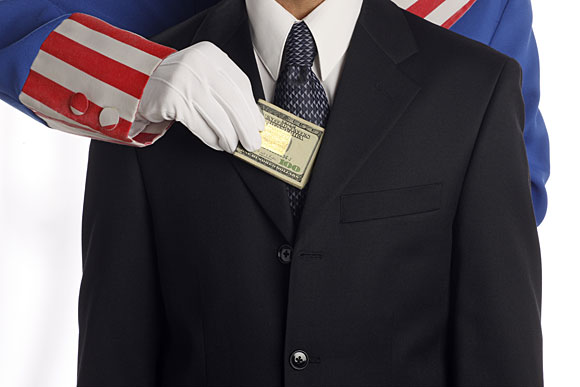In the seemingly endless debate over how and why some taxes should be increased, much of the bluster is starting to skip right past basic logic.
Making a case for raising taxes on somebody else is always easy. Take Greece, for example.
After decades of functioning as little more than a Ponzi scheme, the Greek government is now forced to cut the services, pay and benefits of rioting citizens who could do some real good for their country by just going home and paying more taxes.
Closer to home, the U.S. continues to chug along on a pace that has the government now spending about 30% more than it collects in taxes.
Clearly, higher taxes — especially for anyone but me — could be presented as the obvious solution. And indeed, it might be the best way to solve the deficit problem.
But what is frustrating is some of the back-tested, sleight-of-hand being applied when making the case for higher taxes. This week, for example, Boston College Law School professor Ray Madoff
wrote in Bloomberg that the 15% tax rate on capital gains “cost the government a significant amount of revenue.” By Mr. Madoff's math, if capital gains had been taxed at 35% starting in 2008 — rather than 15% — the Treasury would have collected an additional $100 billion by now.
David Abromowitz, a senior fellow at the Center for American Progress Action Fund, followed similar logic in
a piece he wrote two weeks ago
taking issue with the capital gains rate paid by private-equity investors.
Mr. Abromowitz concluded that the 2003 reduction in the capital gains rate to 15%, from 20%, “contributed significantly to the budget deficit.”
While it is 100% certain that government spending contributed substantially to the budget deficit, it is virtually impossible to calculate accurately the actual impact of tax rates on the deficit — back-tested formulas notwithstanding.
It is no different than claiming whatever revenue was collected through gasoline taxes last year could have been tripled if only the government would have tripled the gasoline tax.
Such flashy and oversimplified claims continue to gloss over and defy a basic tenet of economics: if you want something to grow you subsidize it, and if you want something to slow you tax it.
Mr. Abromowitz tries to poke a hole in this principle by pointing to the fact that investors were putting lots of money into private-equity funds and other investments back in the 1990s when capital gains rates were higher than they are today.
What Mr. Abromowitz and others fail to acknowledge is that there are multiple variables behind any investment decision. This is the exactly why you can't pretend calculate how much tax revenue would have been raked in by hypothetically changing the variables.







